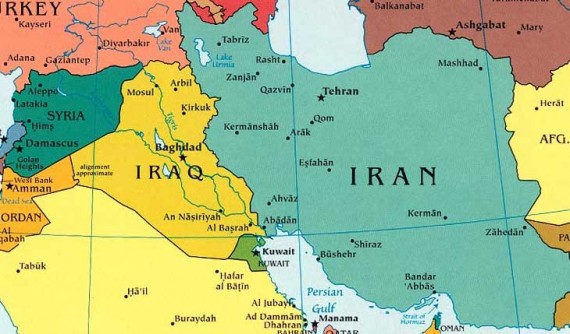Iraqis Helping Iran Evade Sanctions
The United States is accusing Iraq banks and other entities of helping Iran evade the sanctions put in place in response to its nuclear program:
WASHINGTON — When President Obama announced last month that he was barring a Baghdad bank from any dealings with the American banking system, it was a rare acknowledgment of a delicate problem facing the administration in a country that American troops just left: for months, Iraq has been helping Iran skirt economic sanctions imposed on Tehran because of its nuclear program.
The little-known bank singled out by the United States, the Elaf Islamic Bank, is only part of a network of financial institutions and oil-smuggling operations that, according to current and former American and Iraqi government officials and experts on the Iraqi banking sector, has provided Iran with a crucial flow of dollars at a time when sanctions are squeezing its economy.
The Obama administration is not eager for a public showdown with the government of Prime Minister Nuri Kamal al-Maliki over Iran just eight months after the last American troops withdrew from Baghdad.
Still, the administration has held private talks with Iraqi officials to complain about specific instances of financial and logistical ties between the countries, officials say, although they do not regard all trade between them as illegal or, as in the case of smuggling, as something completely new. In one recent instance, when American officials learned that the Iraqi government was aiding the Iranians by allowing them to use Iraqi airspace to ferry supplies to Syria, Mr. Obama called Mr. Maliki to complain. The Iranian planes flew another route.
In response to questions from The New York Times, David S. Cohen, the Treasury Department’s under secretary for terrorism and financial intelligence, provided a written statement saying that Iran “may seek to escape the force of our financial sanctions through Iraqi financial institutions.” But he added that “we will pursue, and are actively pursuing, efforts to prevent Iran from evading U.S. or international financial sanctions, in Iraq or anywhere else.”
Some current and former American and Iraqi officials, along with banking and oil experts, say that Iraqi government officials are turning a blind eye to the large financial flows, smuggling and other trade with Iran. In some cases, they say, government officials, including some close to Mr. Maliki, are directly profiting from the activities.
“Maliki’s government is right in the middle of this,” said one former senior American intelligence official who now does business in Iraq.
There have been plenty of signs in the past that the Maliki government was cozying up to Iran, but this apparent indifference to, if not complicity in, efforts to help the Iranians evade sanctions is perhaps the most blatant Iraqi action to date. It’s not surprising that the Iraqis would be doing this, either. They are far weaker than they were in the days of Saddam Hussein, and good relations with their big neighbor to the east are advisable. Additionally, the fact that Maliki leads a Shia-dominated government means that there is much in common between the two countries.
But let’s get this straight. Ten years ago, Iraq was a relatively powerful counterforce to Iran in region. Now, it’s nearly an ally. Boy, that war sure made sense didn’t it?

This actually ties back in with the Campbell Brown article and the pres campaign in that Dan Senor was advisor to the fellow (name escapes me) Bush named to provisionally run Iraq post invasion. In those heady times we were sending constitutional law experts, free marketeers, and various experts in a ham handed attempt to create a democracy on the euphrates out of whole cloth.
“Additionally, the fact that Maliki leads a Sunni-dominated government means that there is much in common between the two countries.”
Uh, I think you mean Shiite-dominated.
Indeed. Fixed.
or, said another way, the sanctions are porous and they always have been since they depend on the cooperation of the countries that adjoin Iran and they don’t have control over those borders. The tighter the sanctions, the greater the incentives for evading them.
Add to that a lack of cooperation from two Security Council members, Russia and China, and the notion that sanctions will ever induce the Iranians to change whatever policies the sanctions are intended to change looks pretty far-fetched.
Well, when we overthrew Saddam Hussein we shifted the balance of power in the region toward Iran, and we ended up with a government in Iraq that is more naturally favorable to Iran than the Hussein regime.
Since 1953, from Mossadegh to The Shah to the Ayatollah, to Hussein, to Ahmedinejad) we’ve struggled to figure out what to do in that that region, and we still don’t know what we’re doing.
@rudderpedals: Fehrnstrom, not this guy, and nothing to do with the former CNN host Nevermind